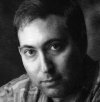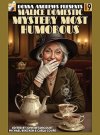What started you on a path to publication?
When I was going to school, I used to make my friends laugh, and I thought maybe I could write humor. So I sent jokes out to many comedy performers. Over time I sold a lot of material.
I wanted to expand what I could do so I began writing short stories. The first ones were just funny. But unfortunately there were few publications that published funny tales. Since I read mystery, horror and sci-fi, I decided to combine those genres with humor. That worked, and I’ve since sold a lot of those types of stories. as well as many serious ones. Eventually, I delved into other areas such as screenplay writing and novels.
What is the biggest lesson that you learned about writing or publishing?
I always thought that if you wrote something that one person loved, then that meant everyone would love it. But I soon learned this was not the case. Publishing is based on opinion and not everyone will have the same idea about what makes a great story. I remember a magazine rejected a tale I wrote and sent it back with many comments about what was wrong with it.I disagreed with most of what the publisher said so the next day, I sent it to a higher level publication. It sold!
What’s your core philosophy when it comes to teaching writing?
My core philosophy is that you learn by doing. Yes, you can read one of my lectures, and have some knowledge about a strategy that I teach. However, in my opinion, the way you really learn, is to do an exercises that I have at the end of each lecture. This will cement the technique into your mind, and also allow you to know if it’s useful for your future writing.
What can students/registrants expect to take away from your workshops?
I teach seven courses for Savvy Authors from, humor writing to, how to write a page-turning novel. My goal with every course is to make them as interesting and fun as I can. But I also try to make them practical.
I think a key element that students take away from my workshops is that if you want to improve you have to write a lot. The author, Malcolm Gladwell has said it takes ten thousand hours to be an expert at anything. To me, this applies to every aspect of writing. If you are trying to come up with ideas for a novel or short story, you should write as many as you can. Generally, the more creative ones will appear at the end.
The same holds true in writing short stories and novels. Try different versions of the scenes you’ve written, as well as the opening, and ending. Maybe you can make them better. Of course this idea of 'writing more,' also applies to the number of short stories or novels you write. When you do more of them the quality improves. If you examine the first novel of an author and a more recent one, you can definitely see the difference.
How do you approach giving constructive feedback without discouraging a student?
I never want anyone to be discouraged in my classes and I try to create a very positive atmosphere. Learning anything new is difficult so if someone just attempts one of the exercises, I feel it’s a win. When I review student’s work I always explain what they did right, and what might require a little improvement. Then I give them examples of how I might do the assignment.
Is there a common writing “rule” that you think is okay to break—and why?
To me, writing is about experimentation and rules can sometimes hold you back from attempting something different. On the other hand, I also believe that you shouldn't throw out rules just because you don't like them. One rule I personally don’t believe in is 'writing only what you know.' To me that is very limiting. How would we write a book about angels or what it’s like to be on a planet where everyone has six arms? Of course some stories do require you to do research. But, nowadays, with the internet, and the library, that’s easily done.
Website: Steve Shrott Mystery and Comedy Writer - Home
Facebook: Log into Facebook
Goodreads: Books by Steve Shrott (Author of Crime & Mystery Short Stories)
Steve Shrott is an award winning short story writer whose tales have appeared in Sherlock Holmes Mystery Magazine, Mystery Weekly, and Black Cat Mystery Magazine. In Flame Tree Press's hard cover volume, Steve's story, The House, appears alongside tales by Author Conan Doyle and Charles Dickens. His work is also in the Anthony Award-winning 2021 Bouchercon Anthology, This Time For Sure, as well as in the recently released Malice Domestic Anthology, Mystery Most Humorous. Two of his comedic mystery novels have been published (Audition for Death and Dead Men Don't Get Married,) and some of his jokes are in the Smithsonian Institution. Steve has also worked in several other areas of the entertainment industry.


When I was going to school, I used to make my friends laugh, and I thought maybe I could write humor. So I sent jokes out to many comedy performers. Over time I sold a lot of material.
I wanted to expand what I could do so I began writing short stories. The first ones were just funny. But unfortunately there were few publications that published funny tales. Since I read mystery, horror and sci-fi, I decided to combine those genres with humor. That worked, and I’ve since sold a lot of those types of stories. as well as many serious ones. Eventually, I delved into other areas such as screenplay writing and novels.
What is the biggest lesson that you learned about writing or publishing?
I always thought that if you wrote something that one person loved, then that meant everyone would love it. But I soon learned this was not the case. Publishing is based on opinion and not everyone will have the same idea about what makes a great story. I remember a magazine rejected a tale I wrote and sent it back with many comments about what was wrong with it.I disagreed with most of what the publisher said so the next day, I sent it to a higher level publication. It sold!
What’s your core philosophy when it comes to teaching writing?
My core philosophy is that you learn by doing. Yes, you can read one of my lectures, and have some knowledge about a strategy that I teach. However, in my opinion, the way you really learn, is to do an exercises that I have at the end of each lecture. This will cement the technique into your mind, and also allow you to know if it’s useful for your future writing.
What can students/registrants expect to take away from your workshops?
I teach seven courses for Savvy Authors from, humor writing to, how to write a page-turning novel. My goal with every course is to make them as interesting and fun as I can. But I also try to make them practical.
I think a key element that students take away from my workshops is that if you want to improve you have to write a lot. The author, Malcolm Gladwell has said it takes ten thousand hours to be an expert at anything. To me, this applies to every aspect of writing. If you are trying to come up with ideas for a novel or short story, you should write as many as you can. Generally, the more creative ones will appear at the end.
The same holds true in writing short stories and novels. Try different versions of the scenes you’ve written, as well as the opening, and ending. Maybe you can make them better. Of course this idea of 'writing more,' also applies to the number of short stories or novels you write. When you do more of them the quality improves. If you examine the first novel of an author and a more recent one, you can definitely see the difference.
How do you approach giving constructive feedback without discouraging a student?
I never want anyone to be discouraged in my classes and I try to create a very positive atmosphere. Learning anything new is difficult so if someone just attempts one of the exercises, I feel it’s a win. When I review student’s work I always explain what they did right, and what might require a little improvement. Then I give them examples of how I might do the assignment.
Is there a common writing “rule” that you think is okay to break—and why?
To me, writing is about experimentation and rules can sometimes hold you back from attempting something different. On the other hand, I also believe that you shouldn't throw out rules just because you don't like them. One rule I personally don’t believe in is 'writing only what you know.' To me that is very limiting. How would we write a book about angels or what it’s like to be on a planet where everyone has six arms? Of course some stories do require you to do research. But, nowadays, with the internet, and the library, that’s easily done.
Website: Steve Shrott Mystery and Comedy Writer - Home
Facebook: Log into Facebook
Goodreads: Books by Steve Shrott (Author of Crime & Mystery Short Stories)
Steve Shrott is an award winning short story writer whose tales have appeared in Sherlock Holmes Mystery Magazine, Mystery Weekly, and Black Cat Mystery Magazine. In Flame Tree Press's hard cover volume, Steve's story, The House, appears alongside tales by Author Conan Doyle and Charles Dickens. His work is also in the Anthony Award-winning 2021 Bouchercon Anthology, This Time For Sure, as well as in the recently released Malice Domestic Anthology, Mystery Most Humorous. Two of his comedic mystery novels have been published (Audition for Death and Dead Men Don't Get Married,) and some of his jokes are in the Smithsonian Institution. Steve has also worked in several other areas of the entertainment industry.


Last edited by a moderator:
Upvote
0